“A land of little and a route of much” is how I often view this present journey and it is how I’ve viewed many of Himalayan trade routes I’ve travelled. Our present route here in Mustang has taken us past an abandoned stone building that acted as the equivalent of a postal office and it now just shudders in the wind with its memories. The Khampas of eastern Tibet are part of Mustang’s history, having fought continued pitched battles during the Chinese occupation. The feared and often misunderstood Khampas had left impressions wherever they had travelled and they had certainly left their remnants here in Mustang.
Beyond 4,000 metres, the old postal structure has fallen in heaps with time, wind and cold. Little remains of what was once a drop off or pick up point for horsemen and travellers. The pathway we take snakes and drops and then always, it rises and rises.
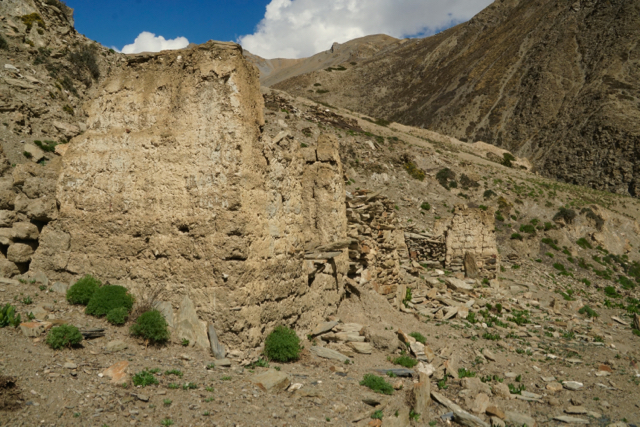
One of many dilapidated structures that sit alongside our trail. Many abandoned communities lie in eastern Mustang.
To see such a hint of humanity’s presence is almost startling in this stark wind-infested world where we’ve joyfully encountered so little. It is quite a wonderful world where Nature dictates all and all of our team feel and accept it. We’ve all found our rhythm and Keoki, TJ, and Marcus are to be found at the lead following the fiercely strong Subash. Subash at times has to be gently instructed to keep the pace reasonable. His mountain power is something immeasurable at times and even while singing and hauling his kit, his pace tends to increase if not limited.
Meli and Julie trail up the rear but have also found a good pace and our team is a series of loosely strung dots along the route. Kiran and Pasang follow the ladies like wolfhounds. I am allowed to wander at will up, and into valleys to see what remains and admire the etched and wind-blown lands. Every once in a while amidst the wide landscapes a tiny paths darts off and it is likely that I’ll try and follow it.
The Eastern flanks and communities (nomadic) of the Kali Gandaki Gorge have not had an easy time of it as water resources have dried up. Glaciers no longer provide and we see the evidence of lost communities that for centuries stood, but had to move on. According to locals, snow doesn’t fall like it once did, and temperatures have steadily eased upwards. The terminology perhaps doesn’t matter…what matters is that it has happened and people have vacated. It isn’t change that has brought this on for a people who are used to Mother Nature’s moods…it is the speed of it.
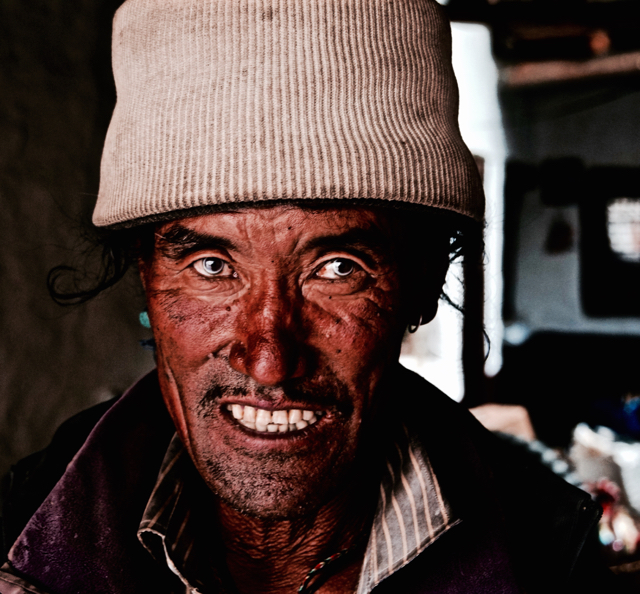
A horseman who runs commodities and people like a small shuttle service was there to assist our team….which was followed by tea.
We plough through an 11 hr journey during one long segment, having to circumnavigate a mountain pass and the camp we crawl into seems somehow different. Abhu mentions that the region is known for Snow Leopards, and one morning we see the scat marks of one of the serene cats.
Mustang’s name has long been a question as it is known to locals as the Kingdom of “Lo”. Mustang is thought to be an aberration of ‘Lo Manthang’, which is the largest city in the north of Mustang. It doesn’t stop there either, as ‘Manthang’ is thought to be from “Mè” or “Mèn’thang” relating to grasslands and medicine. It is what we’ve been told by a local monk and it doesn’t surprise that once more an original name has been twisted into something more ‘suitable’ (but barely recognizable).
Medicine’s, tea, salt, rice paper, and Buddhist scriptures could all be found moving through these huge spaces of light and colour. Mustang is colour it seems and light and wind. Mustang is also a place where the old gods and goddesses held sway, as much of the region was steeped in the ancient Bon traditions which predated Buddhism.
Our days get more interesting with each of our team member’s revealing of their character. This process is as entertaining and brilliant as the opening up of the huge spaces before us. Our team needs very little but they do require pay, respect and some fun and considering what they allow us in terms of freedom it is quite extraordinary how valuable to us they are.
The tea that we are served by our chef Santosh comes in the morning, and every evening but still I prepare my own stash for myself and anyone else who desires it. It is a cake of He Kai raw green Puerh from ancient trees that brings with it some wonderful vegetal astringency and acts as an eternal tonic for me. As I unwrap it, I think always of the extra brick of tea that I’ve brought along for Konga, an old trader that lives further north. I met him two years ago and made a promise that I’d return to chat about the trade routes. I’d also promised him that I’d return with some of the tea that he loved: a Puerh from Yunnan, that I’d sourced a month ago. He had traded in tea and salt in his days and remembers well the teas from “the east”. It is one of the other reasons I’ve come back – because of a promise.

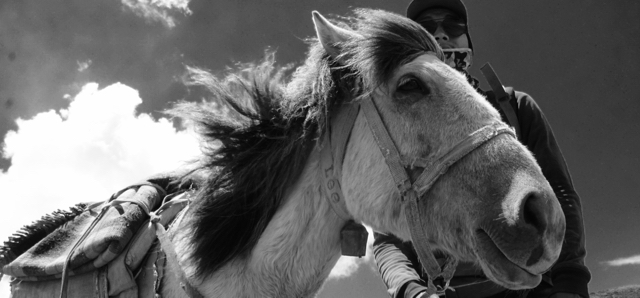

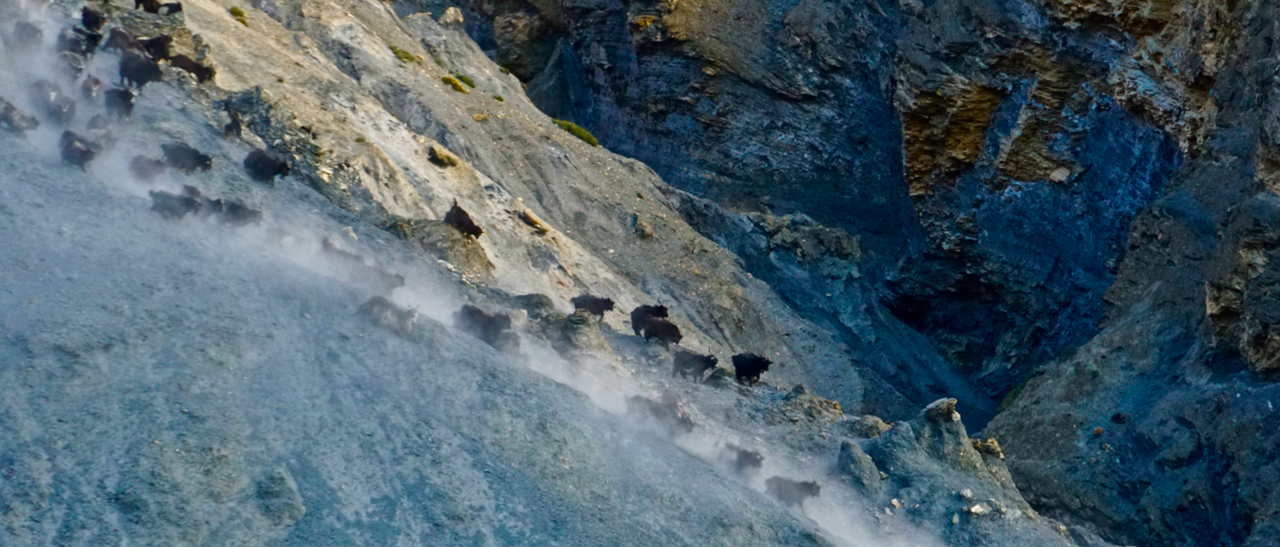
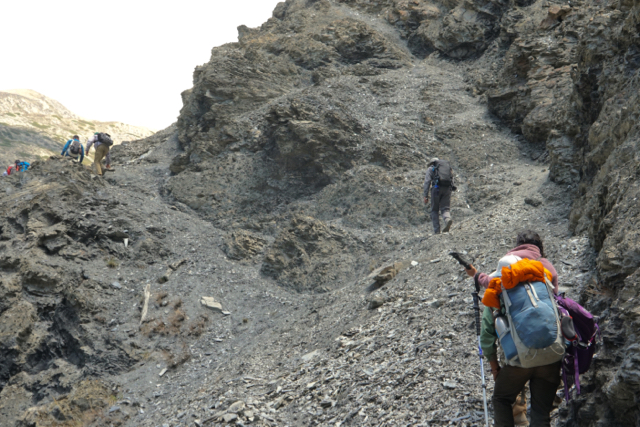
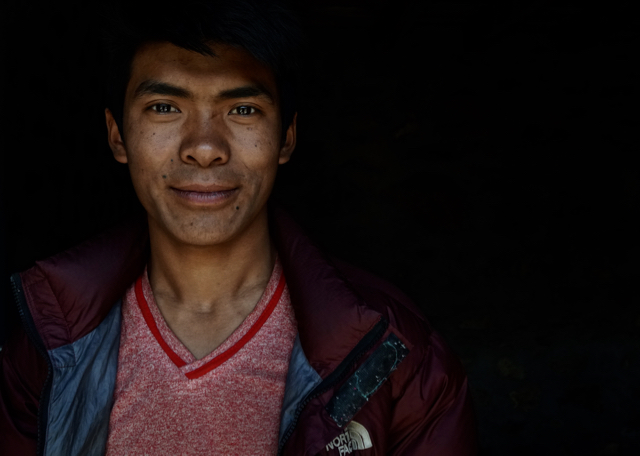
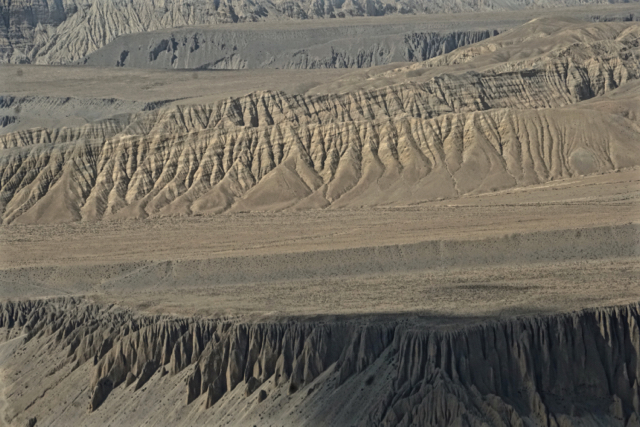
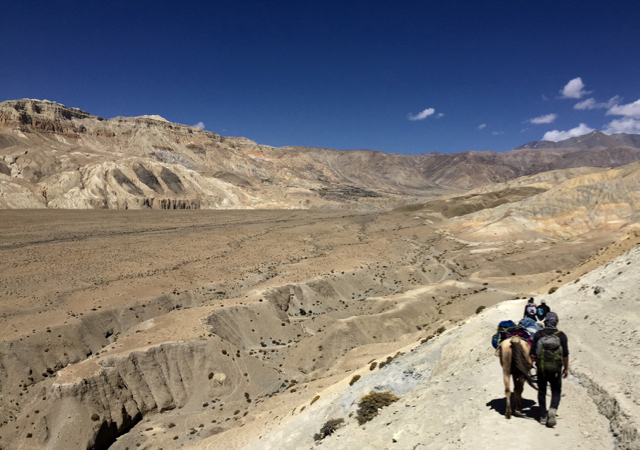
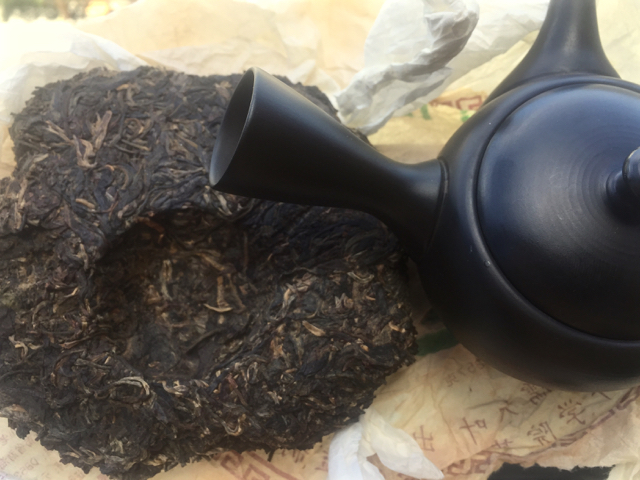
Jeff –
So glad you keep these journals updated.
So glad Julie got to accompany on this trek!
So glad you show the amazing horses!
So glad you write in a very wind-driven, illuminating way.
So glad you make extra tea – in a the kyusu of such lovely form.
Have been enjoying the teas from the Jalam Tea club (so glad for that, too!)
and
So glad such a sweet promise to Konga was part of your reason for putting one foot in front of the other.
My best from the Manitoulin – in full summer swing.
Cheers,
Lynne
And Lynne – so glad that you continue to join on these journeys.
Sending good mana from the Pacific to your beautiful island.
…Konga is a being entirely worth any journey.
be well,
Jeff